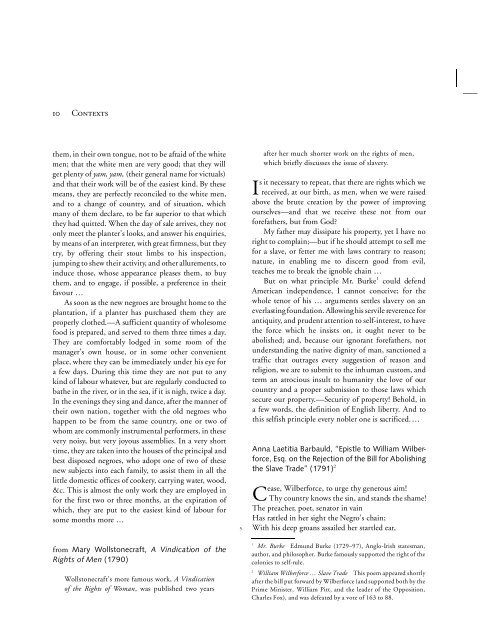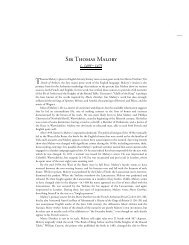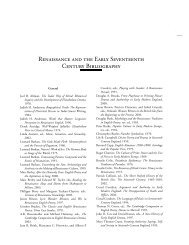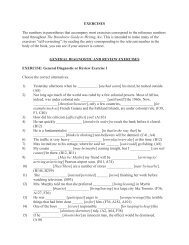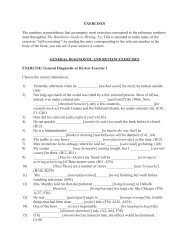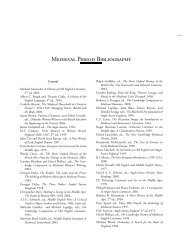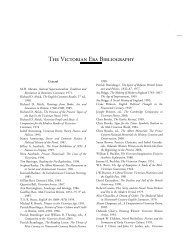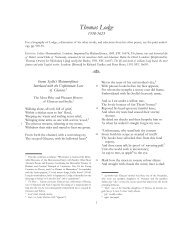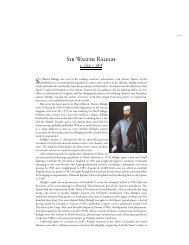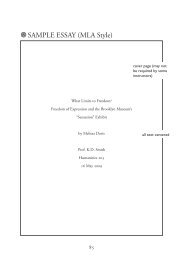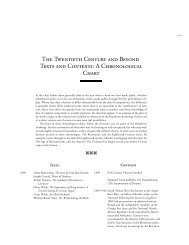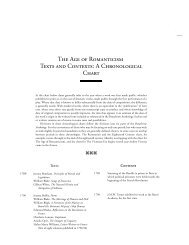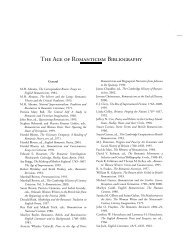Contexts: The Abolition of Slavery - Broadview Press Publisher's Blog
Contexts: The Abolition of Slavery - Broadview Press Publisher's Blog
Contexts: The Abolition of Slavery - Broadview Press Publisher's Blog
Create successful ePaper yourself
Turn your PDF publications into a flip-book with our unique Google optimized e-Paper software.
10 <strong>Contexts</strong><br />
them, in their own tongue, not to be afraid <strong>of</strong> the white<br />
men; that the white men are very good; that they will<br />
get plenty <strong>of</strong> yam, yam, (their general name for victuals)<br />
and that their work will be <strong>of</strong> the easiest kind. By these<br />
means, they are perfectly reconciled to the white men,<br />
and to a change <strong>of</strong> country, and <strong>of</strong> situation, which<br />
many <strong>of</strong> them declare, to be far superior to that which<br />
they had quitted. When the day <strong>of</strong> sale arrives, they not<br />
only meet the planter’s looks, and answer his enquiries,<br />
by means <strong>of</strong> an interpreter, with great firmness, but they<br />
try, by <strong>of</strong>fering their stout limbs to his inspection,<br />
jumping to shew their activity, and other allurements, to<br />
induce those, whose appearance pleases them, to buy<br />
them, and to engage, if possible, a preference in their<br />
favour …<br />
As soon as the new negroes are brought home to the<br />
plantation, if a planter has purchased them they are<br />
properly clothed.—A sufficient quantity <strong>of</strong> wholesome<br />
food is prepared, and served to them three times a day.<br />
<strong>The</strong>y are comfortably lodged in some room <strong>of</strong> the<br />
manager’s own house, or in some other convenient<br />
place, where they can be immediately under his eye for<br />
a few days. During this time they are not put to any<br />
kind <strong>of</strong> labour whatever, but are regularly conducted to<br />
bathe in the river, or in the sea, if it is nigh, twice a day.<br />
In the evenings they sing and dance, after the manner <strong>of</strong><br />
their own nation, together with the old negroes who<br />
happen to be from the same country, one or two <strong>of</strong><br />
whom are commonly instrumental performers, in these<br />
very noisy, but very joyous assemblies. In a very short<br />
time, they are taken into the houses <strong>of</strong> the principal and<br />
best disposed negroes, who adopt one <strong>of</strong> two <strong>of</strong> these<br />
new subjects into each family, to assist them in all the<br />
little domestic <strong>of</strong>fices <strong>of</strong> cookery, carrying water, wood,<br />
&c. This is almost the only work they are employed in<br />
for the first two or three months, at the expiration <strong>of</strong><br />
which, they are put to the easiest kind <strong>of</strong> labour for<br />
some months more …<br />
from Mary Wollstonecraft, A Vindication <strong>of</strong> the<br />
Rights <strong>of</strong> Men (1790)<br />
Wollstonecraft’s more famous work, A Vindication<br />
<strong>of</strong> the Rights <strong>of</strong> Woman, was published two years<br />
5<br />
after her much shorter work on the rights <strong>of</strong> men,<br />
which briefly discusses the issue <strong>of</strong> slavery.<br />
Is it necessary to repeat, that there are rights which we<br />
received, at our birth, as men, when we were raised<br />
above the brute creation by the power <strong>of</strong> improving<br />
ourselves—and that we receive these not from our<br />
forefathers, but from God?<br />
My father may dissipate his property, yet I have no<br />
right to complain;—but if he should attempt to sell me<br />
for a slave, or fetter me with laws contrary to reason;<br />
nature, in enabling me to discern good from evil,<br />
teaches me to break the ignoble chain …<br />
But on what principle Mr. Burke 1 could defend<br />
American independence, I cannot conceive; for the<br />
whole tenor <strong>of</strong> his … arguments settles slavery on an<br />
everlasting foundation. Allowing his servile reverence for<br />
antiquity, and prudent attention to self-interest, to have<br />
the force which he insists on, it ought never to be<br />
abolished; and, because our ignorant forefathers, not<br />
understanding the native dignity <strong>of</strong> man, sanctioned a<br />
traffic that outrages every suggestion <strong>of</strong> reason and<br />
religion, we are to submit to the inhuman custom, and<br />
term an atrocious insult to humanity the love <strong>of</strong> our<br />
country and a proper submission to those laws which<br />
secure our property.—Security <strong>of</strong> property! Behold, in<br />
a few words, the definition <strong>of</strong> English liberty. And to<br />
this selfish principle every nobler one is sacrificed.…<br />
Anna Laetitia Barbauld, “Epistle to William Wilberforce,<br />
Esq. on the Rejection <strong>of</strong> the Bill for Abolishing<br />
the Slave Trade” (1791) 2<br />
Cease, Wilberforce, to urge thy generous aim!<br />
Thy country knows the sin, and stands the shame!<br />
<strong>The</strong> preacher, poet, senator in vain<br />
Has rattled in her sight the Negro’s chain;<br />
With his deep groans assailed her startled ear,<br />
1 Mr. Burke Edmund Burke (1729–97), Anglo-Irish statesman,<br />
author, and philosopher. Burke famously supported the right <strong>of</strong> the<br />
colonies to self-rule.<br />
2 William Wilberforce … Slave Trade This poem appeared shortly<br />
after the bill put forward by Wilberforce (and supported both by the<br />
Prime Minister, William Pitt, and the leader <strong>of</strong> the Opposition,<br />
Charles Fox), and was defeated by a vote <strong>of</strong> 163 to 88.


